Global Business Report: International Market Entry and Leadership
VerifiedAdded on 2022/12/27
|19
|6225
|49
Report
AI Summary
This report provides a comprehensive analysis of global business operations, focusing on the European Economic Community (EEC) and its implications, the motivations behind companies entering international markets, and the challenges they face. It examines specific strategies for market entry, including an analysis of Tesco plc's potential entry into new international markets, considering entry modes, challenges, and solutions. The report also explores the leadership qualities essential for successful market entry and concludes with a reflective essay summarizing the module's key concepts. The report covers various aspects like tariff barriers, administrative policies, cultural diversities, political instability, place constraints, exchange rate variations, norms, ethics, terrorism and racism faced by companies while entering into international markets.
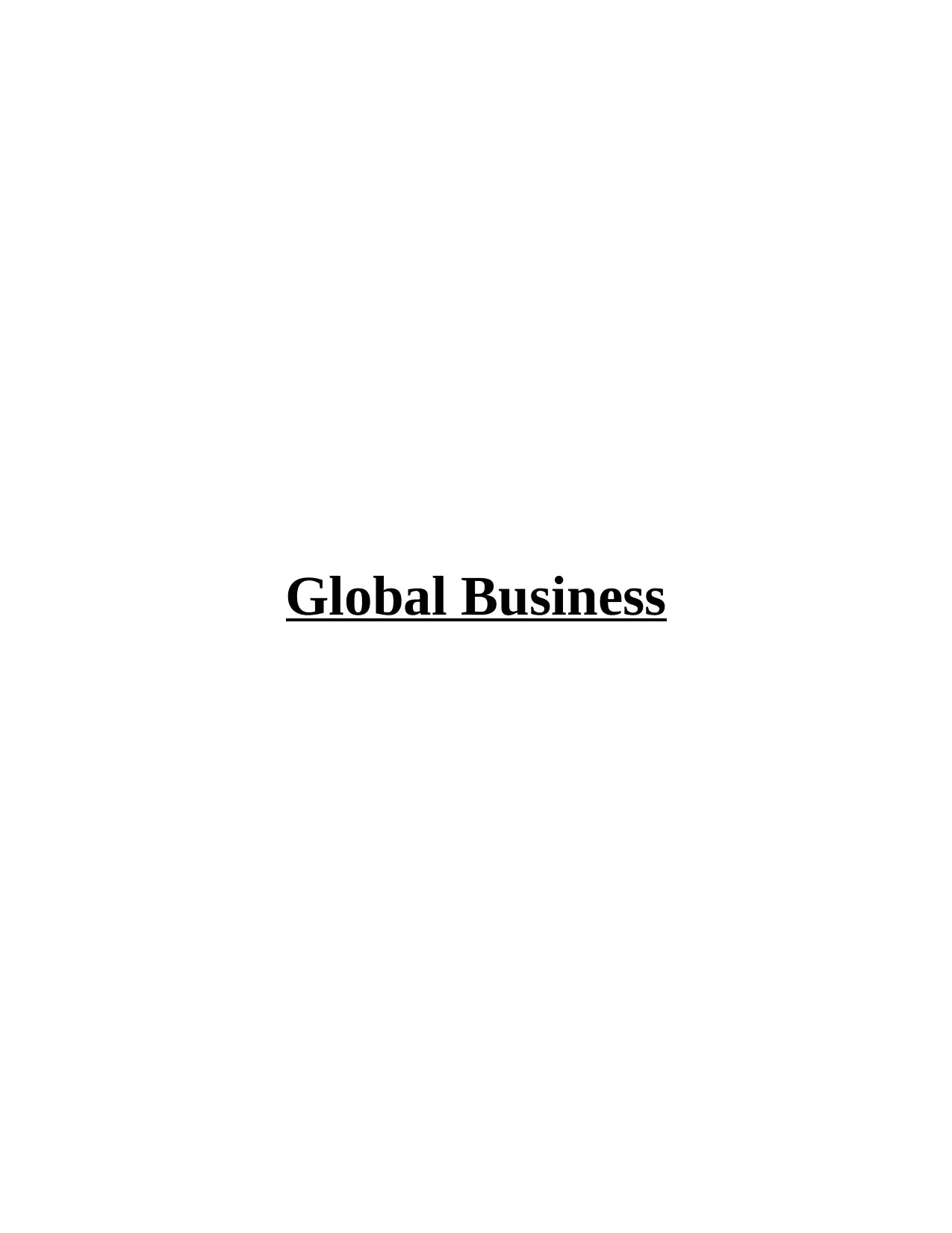
Global Business
Paraphrase This Document
Need a fresh take? Get an instant paraphrase of this document with our AI Paraphraser
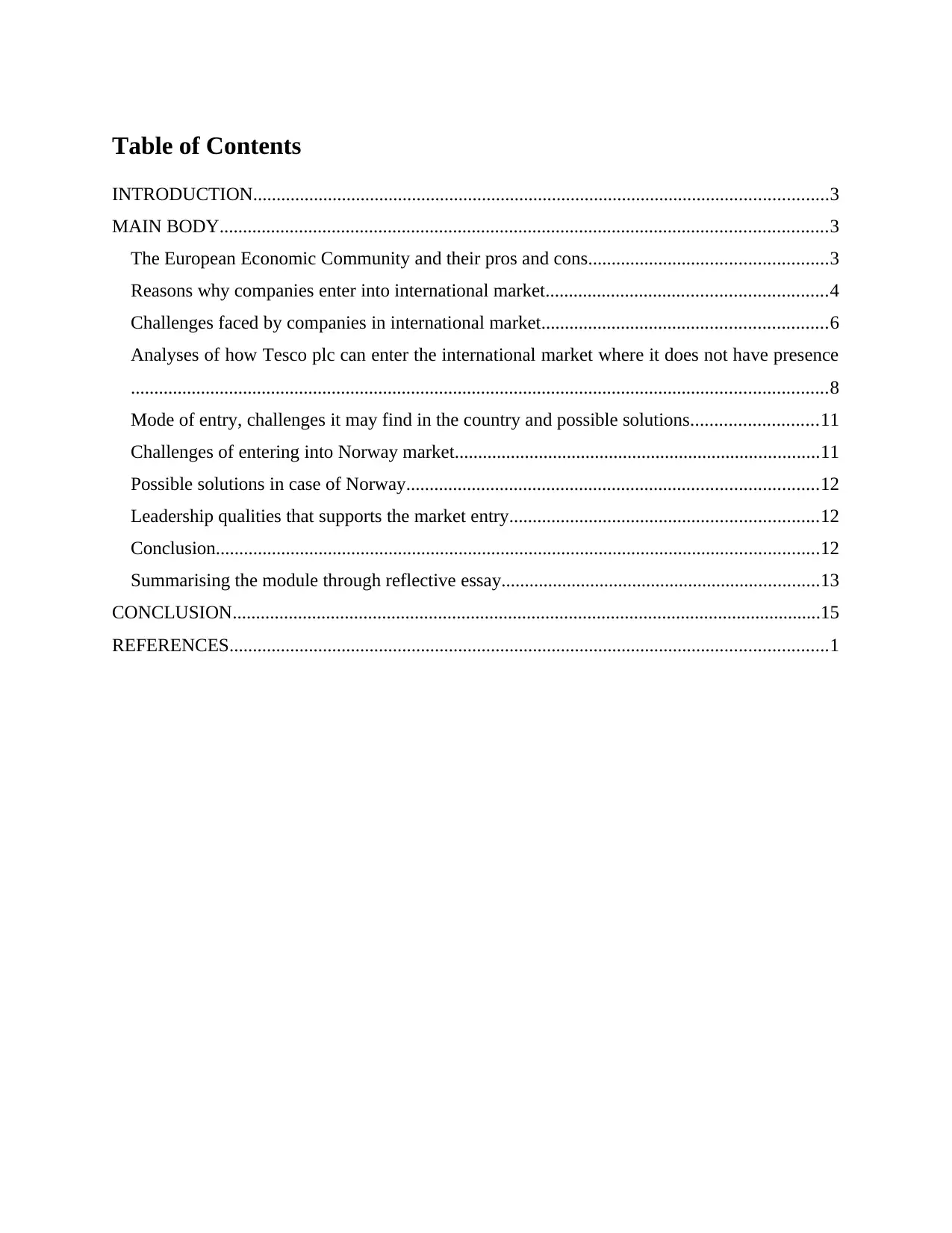
Table of Contents
INTRODUCTION...........................................................................................................................3
MAIN BODY..................................................................................................................................3
The European Economic Community and their pros and cons...................................................3
Reasons why companies enter into international market............................................................4
Challenges faced by companies in international market.............................................................6
Analyses of how Tesco plc can enter the international market where it does not have presence
.....................................................................................................................................................8
Mode of entry, challenges it may find in the country and possible solutions...........................11
Challenges of entering into Norway market..............................................................................11
Possible solutions in case of Norway........................................................................................12
Leadership qualities that supports the market entry..................................................................12
Conclusion.................................................................................................................................12
Summarising the module through reflective essay....................................................................13
CONCLUSION..............................................................................................................................15
REFERENCES................................................................................................................................1
INTRODUCTION...........................................................................................................................3
MAIN BODY..................................................................................................................................3
The European Economic Community and their pros and cons...................................................3
Reasons why companies enter into international market............................................................4
Challenges faced by companies in international market.............................................................6
Analyses of how Tesco plc can enter the international market where it does not have presence
.....................................................................................................................................................8
Mode of entry, challenges it may find in the country and possible solutions...........................11
Challenges of entering into Norway market..............................................................................11
Possible solutions in case of Norway........................................................................................12
Leadership qualities that supports the market entry..................................................................12
Conclusion.................................................................................................................................12
Summarising the module through reflective essay....................................................................13
CONCLUSION..............................................................................................................................15
REFERENCES................................................................................................................................1
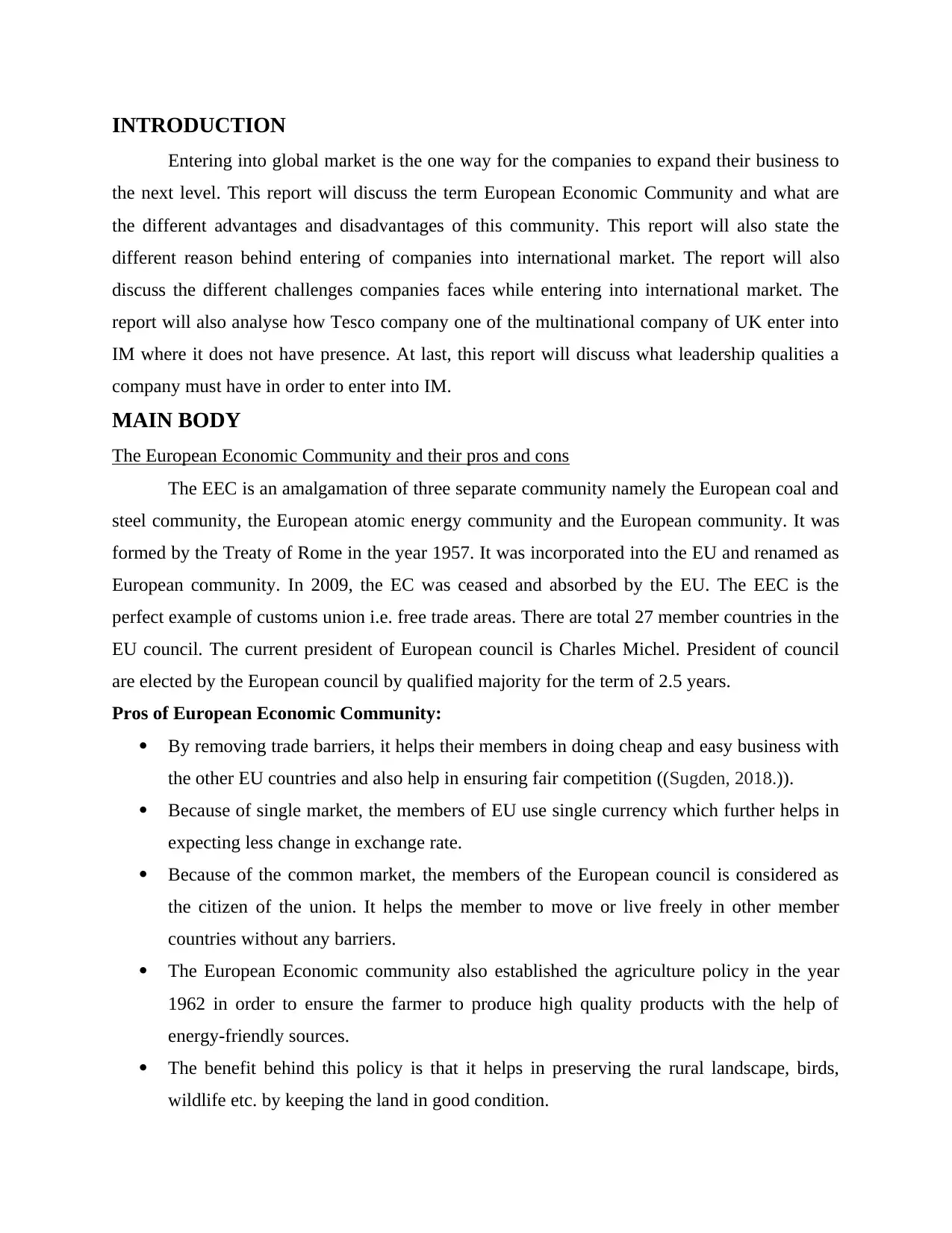
INTRODUCTION
Entering into global market is the one way for the companies to expand their business to
the next level. This report will discuss the term European Economic Community and what are
the different advantages and disadvantages of this community. This report will also state the
different reason behind entering of companies into international market. The report will also
discuss the different challenges companies faces while entering into international market. The
report will also analyse how Tesco company one of the multinational company of UK enter into
IM where it does not have presence. At last, this report will discuss what leadership qualities a
company must have in order to enter into IM.
MAIN BODY
The European Economic Community and their pros and cons
The EEC is an amalgamation of three separate community namely the European coal and
steel community, the European atomic energy community and the European community. It was
formed by the Treaty of Rome in the year 1957. It was incorporated into the EU and renamed as
European community. In 2009, the EC was ceased and absorbed by the EU. The EEC is the
perfect example of customs union i.e. free trade areas. There are total 27 member countries in the
EU council. The current president of European council is Charles Michel. President of council
are elected by the European council by qualified majority for the term of 2.5 years.
Pros of European Economic Community:
By removing trade barriers, it helps their members in doing cheap and easy business with
the other EU countries and also help in ensuring fair competition ((Sugden, 2018.)).
Because of single market, the members of EU use single currency which further helps in
expecting less change in exchange rate.
Because of the common market, the members of the European council is considered as
the citizen of the union. It helps the member to move or live freely in other member
countries without any barriers.
The European Economic community also established the agriculture policy in the year
1962 in order to ensure the farmer to produce high quality products with the help of
energy-friendly sources.
The benefit behind this policy is that it helps in preserving the rural landscape, birds,
wildlife etc. by keeping the land in good condition.
Entering into global market is the one way for the companies to expand their business to
the next level. This report will discuss the term European Economic Community and what are
the different advantages and disadvantages of this community. This report will also state the
different reason behind entering of companies into international market. The report will also
discuss the different challenges companies faces while entering into international market. The
report will also analyse how Tesco company one of the multinational company of UK enter into
IM where it does not have presence. At last, this report will discuss what leadership qualities a
company must have in order to enter into IM.
MAIN BODY
The European Economic Community and their pros and cons
The EEC is an amalgamation of three separate community namely the European coal and
steel community, the European atomic energy community and the European community. It was
formed by the Treaty of Rome in the year 1957. It was incorporated into the EU and renamed as
European community. In 2009, the EC was ceased and absorbed by the EU. The EEC is the
perfect example of customs union i.e. free trade areas. There are total 27 member countries in the
EU council. The current president of European council is Charles Michel. President of council
are elected by the European council by qualified majority for the term of 2.5 years.
Pros of European Economic Community:
By removing trade barriers, it helps their members in doing cheap and easy business with
the other EU countries and also help in ensuring fair competition ((Sugden, 2018.)).
Because of single market, the members of EU use single currency which further helps in
expecting less change in exchange rate.
Because of the common market, the members of the European council is considered as
the citizen of the union. It helps the member to move or live freely in other member
countries without any barriers.
The European Economic community also established the agriculture policy in the year
1962 in order to ensure the farmer to produce high quality products with the help of
energy-friendly sources.
The benefit behind this policy is that it helps in preserving the rural landscape, birds,
wildlife etc. by keeping the land in good condition.
⊘ This is a preview!⊘
Do you want full access?
Subscribe today to unlock all pages.

Trusted by 1+ million students worldwide
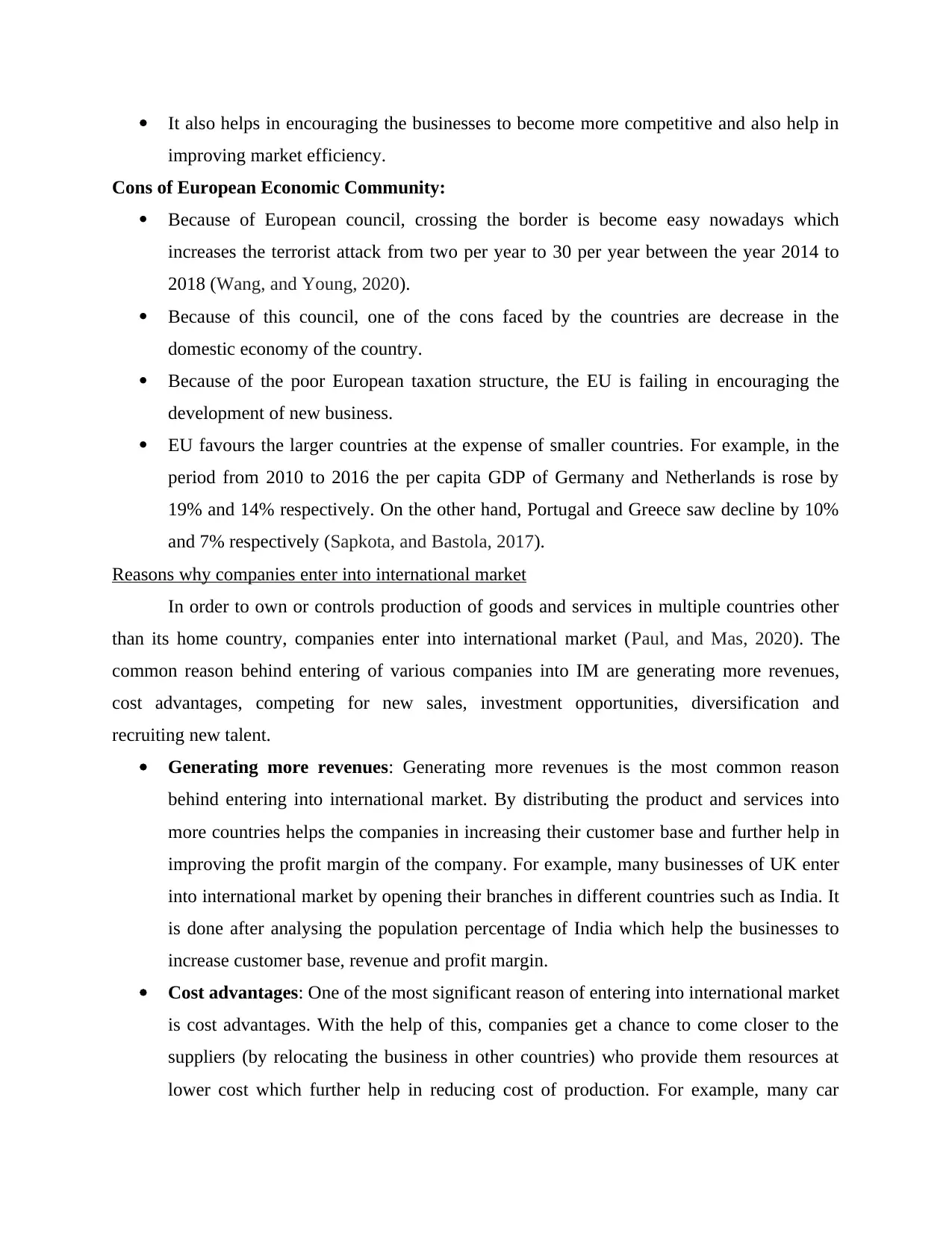
It also helps in encouraging the businesses to become more competitive and also help in
improving market efficiency.
Cons of European Economic Community:
Because of European council, crossing the border is become easy nowadays which
increases the terrorist attack from two per year to 30 per year between the year 2014 to
2018 (Wang, and Young, 2020).
Because of this council, one of the cons faced by the countries are decrease in the
domestic economy of the country.
Because of the poor European taxation structure, the EU is failing in encouraging the
development of new business.
EU favours the larger countries at the expense of smaller countries. For example, in the
period from 2010 to 2016 the per capita GDP of Germany and Netherlands is rose by
19% and 14% respectively. On the other hand, Portugal and Greece saw decline by 10%
and 7% respectively (Sapkota, and Bastola, 2017).
Reasons why companies enter into international market
In order to own or controls production of goods and services in multiple countries other
than its home country, companies enter into international market (Paul, and Mas, 2020). The
common reason behind entering of various companies into IM are generating more revenues,
cost advantages, competing for new sales, investment opportunities, diversification and
recruiting new talent.
Generating more revenues: Generating more revenues is the most common reason
behind entering into international market. By distributing the product and services into
more countries helps the companies in increasing their customer base and further help in
improving the profit margin of the company. For example, many businesses of UK enter
into international market by opening their branches in different countries such as India. It
is done after analysing the population percentage of India which help the businesses to
increase customer base, revenue and profit margin.
Cost advantages: One of the most significant reason of entering into international market
is cost advantages. With the help of this, companies get a chance to come closer to the
suppliers (by relocating the business in other countries) who provide them resources at
lower cost which further help in reducing cost of production. For example, many car
improving market efficiency.
Cons of European Economic Community:
Because of European council, crossing the border is become easy nowadays which
increases the terrorist attack from two per year to 30 per year between the year 2014 to
2018 (Wang, and Young, 2020).
Because of this council, one of the cons faced by the countries are decrease in the
domestic economy of the country.
Because of the poor European taxation structure, the EU is failing in encouraging the
development of new business.
EU favours the larger countries at the expense of smaller countries. For example, in the
period from 2010 to 2016 the per capita GDP of Germany and Netherlands is rose by
19% and 14% respectively. On the other hand, Portugal and Greece saw decline by 10%
and 7% respectively (Sapkota, and Bastola, 2017).
Reasons why companies enter into international market
In order to own or controls production of goods and services in multiple countries other
than its home country, companies enter into international market (Paul, and Mas, 2020). The
common reason behind entering of various companies into IM are generating more revenues,
cost advantages, competing for new sales, investment opportunities, diversification and
recruiting new talent.
Generating more revenues: Generating more revenues is the most common reason
behind entering into international market. By distributing the product and services into
more countries helps the companies in increasing their customer base and further help in
improving the profit margin of the company. For example, many businesses of UK enter
into international market by opening their branches in different countries such as India. It
is done after analysing the population percentage of India which help the businesses to
increase customer base, revenue and profit margin.
Cost advantages: One of the most significant reason of entering into international market
is cost advantages. With the help of this, companies get a chance to come closer to the
suppliers (by relocating the business in other countries) who provide them resources at
lower cost which further help in reducing cost of production. For example, many car
Paraphrase This Document
Need a fresh take? Get an instant paraphrase of this document with our AI Paraphraser
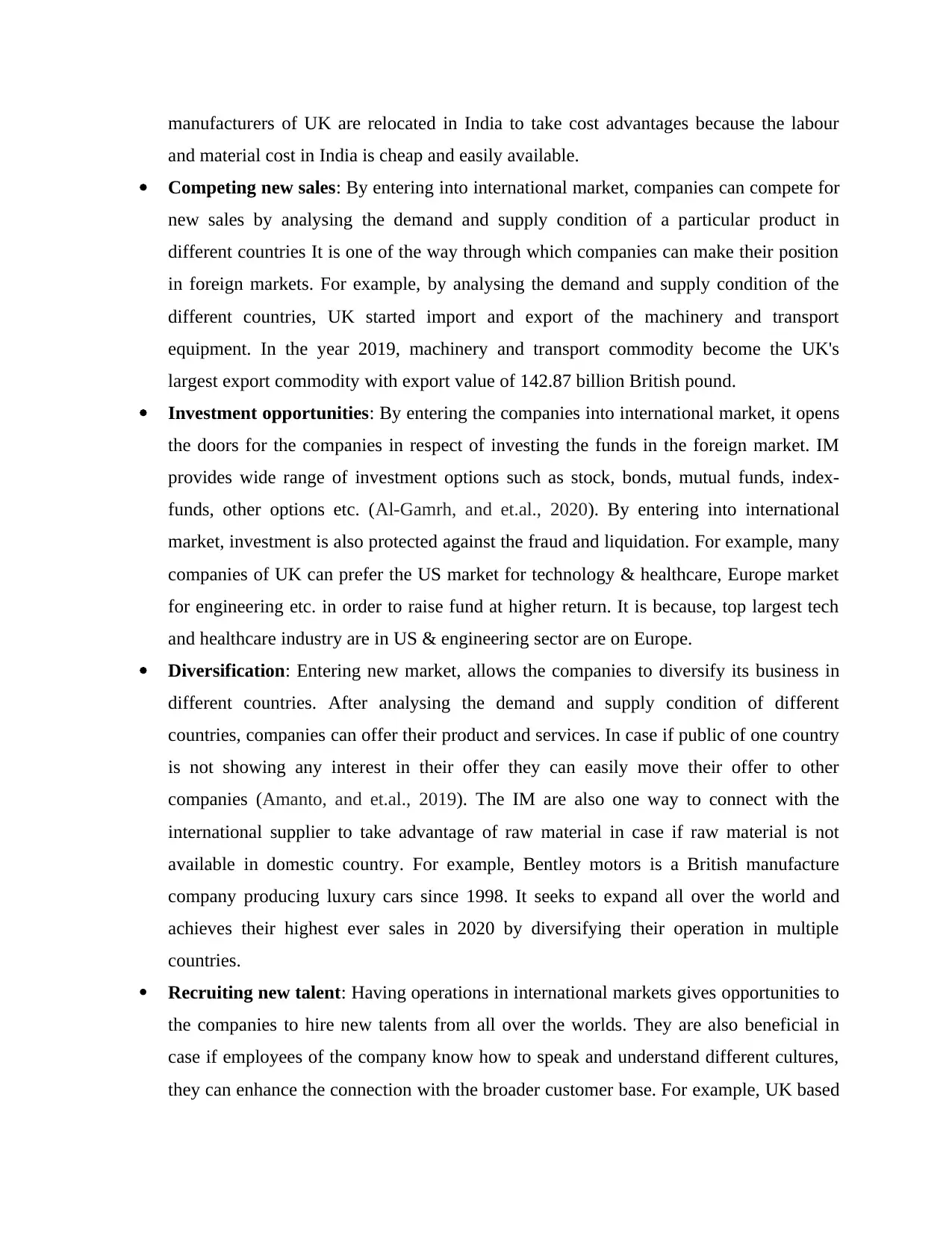
manufacturers of UK are relocated in India to take cost advantages because the labour
and material cost in India is cheap and easily available.
Competing new sales: By entering into international market, companies can compete for
new sales by analysing the demand and supply condition of a particular product in
different countries It is one of the way through which companies can make their position
in foreign markets. For example, by analysing the demand and supply condition of the
different countries, UK started import and export of the machinery and transport
equipment. In the year 2019, machinery and transport commodity become the UK's
largest export commodity with export value of 142.87 billion British pound.
Investment opportunities: By entering the companies into international market, it opens
the doors for the companies in respect of investing the funds in the foreign market. IM
provides wide range of investment options such as stock, bonds, mutual funds, index-
funds, other options etc. (Al-Gamrh, and et.al., 2020). By entering into international
market, investment is also protected against the fraud and liquidation. For example, many
companies of UK can prefer the US market for technology & healthcare, Europe market
for engineering etc. in order to raise fund at higher return. It is because, top largest tech
and healthcare industry are in US & engineering sector are on Europe.
Diversification: Entering new market, allows the companies to diversify its business in
different countries. After analysing the demand and supply condition of different
countries, companies can offer their product and services. In case if public of one country
is not showing any interest in their offer they can easily move their offer to other
companies (Amanto, and et.al., 2019). The IM are also one way to connect with the
international supplier to take advantage of raw material in case if raw material is not
available in domestic country. For example, Bentley motors is a British manufacture
company producing luxury cars since 1998. It seeks to expand all over the world and
achieves their highest ever sales in 2020 by diversifying their operation in multiple
countries.
Recruiting new talent: Having operations in international markets gives opportunities to
the companies to hire new talents from all over the worlds. They are also beneficial in
case if employees of the company know how to speak and understand different cultures,
they can enhance the connection with the broader customer base. For example, UK based
and material cost in India is cheap and easily available.
Competing new sales: By entering into international market, companies can compete for
new sales by analysing the demand and supply condition of a particular product in
different countries It is one of the way through which companies can make their position
in foreign markets. For example, by analysing the demand and supply condition of the
different countries, UK started import and export of the machinery and transport
equipment. In the year 2019, machinery and transport commodity become the UK's
largest export commodity with export value of 142.87 billion British pound.
Investment opportunities: By entering the companies into international market, it opens
the doors for the companies in respect of investing the funds in the foreign market. IM
provides wide range of investment options such as stock, bonds, mutual funds, index-
funds, other options etc. (Al-Gamrh, and et.al., 2020). By entering into international
market, investment is also protected against the fraud and liquidation. For example, many
companies of UK can prefer the US market for technology & healthcare, Europe market
for engineering etc. in order to raise fund at higher return. It is because, top largest tech
and healthcare industry are in US & engineering sector are on Europe.
Diversification: Entering new market, allows the companies to diversify its business in
different countries. After analysing the demand and supply condition of different
countries, companies can offer their product and services. In case if public of one country
is not showing any interest in their offer they can easily move their offer to other
companies (Amanto, and et.al., 2019). The IM are also one way to connect with the
international supplier to take advantage of raw material in case if raw material is not
available in domestic country. For example, Bentley motors is a British manufacture
company producing luxury cars since 1998. It seeks to expand all over the world and
achieves their highest ever sales in 2020 by diversifying their operation in multiple
countries.
Recruiting new talent: Having operations in international markets gives opportunities to
the companies to hire new talents from all over the worlds. They are also beneficial in
case if employees of the company know how to speak and understand different cultures,
they can enhance the connection with the broader customer base. For example, UK based
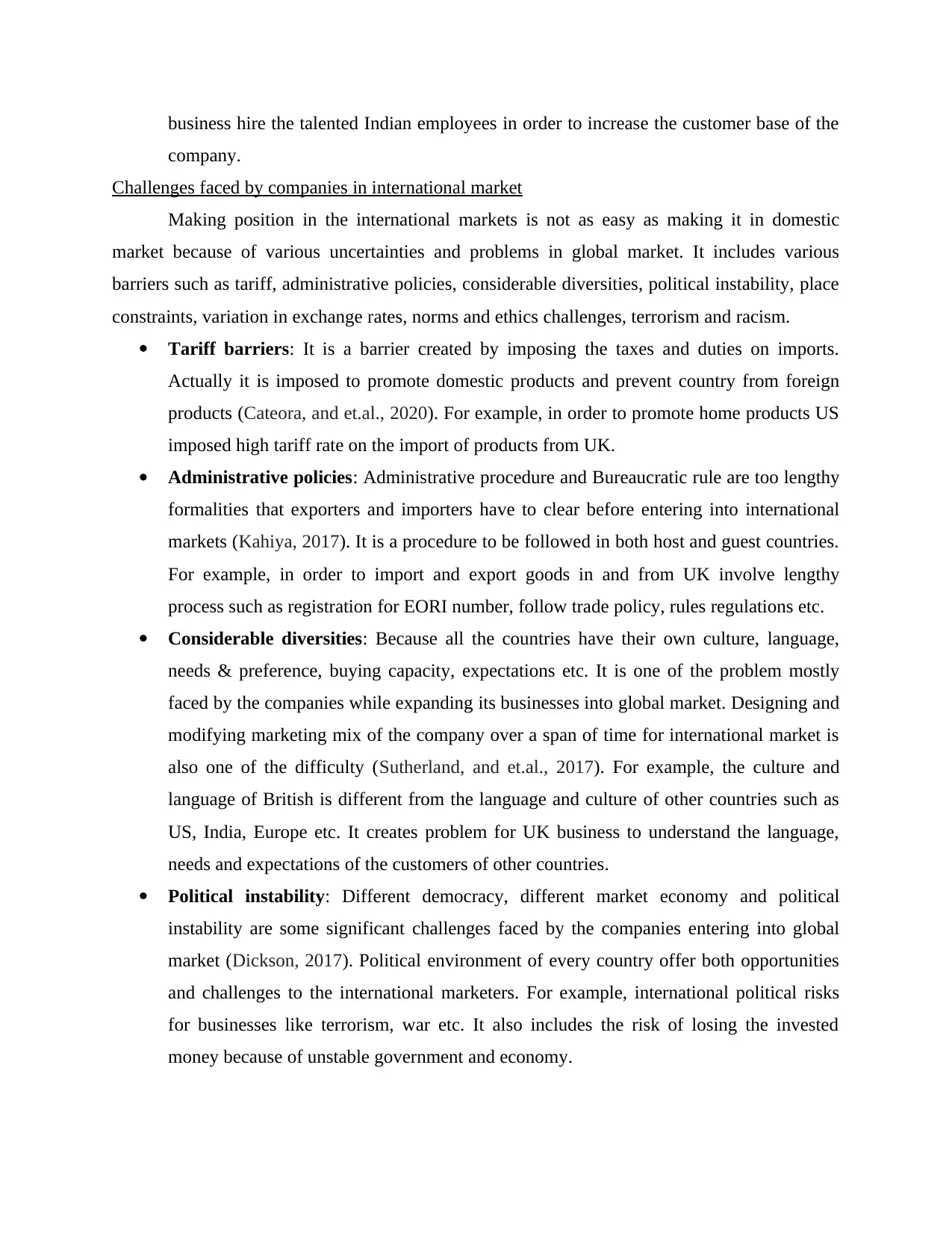
business hire the talented Indian employees in order to increase the customer base of the
company.
Challenges faced by companies in international market
Making position in the international markets is not as easy as making it in domestic
market because of various uncertainties and problems in global market. It includes various
barriers such as tariff, administrative policies, considerable diversities, political instability, place
constraints, variation in exchange rates, norms and ethics challenges, terrorism and racism.
Tariff barriers: It is a barrier created by imposing the taxes and duties on imports.
Actually it is imposed to promote domestic products and prevent country from foreign
products (Cateora, and et.al., 2020). For example, in order to promote home products US
imposed high tariff rate on the import of products from UK.
Administrative policies: Administrative procedure and Bureaucratic rule are too lengthy
formalities that exporters and importers have to clear before entering into international
markets (Kahiya, 2017). It is a procedure to be followed in both host and guest countries.
For example, in order to import and export goods in and from UK involve lengthy
process such as registration for EORI number, follow trade policy, rules regulations etc.
Considerable diversities: Because all the countries have their own culture, language,
needs & preference, buying capacity, expectations etc. It is one of the problem mostly
faced by the companies while expanding its businesses into global market. Designing and
modifying marketing mix of the company over a span of time for international market is
also one of the difficulty (Sutherland, and et.al., 2017). For example, the culture and
language of British is different from the language and culture of other countries such as
US, India, Europe etc. It creates problem for UK business to understand the language,
needs and expectations of the customers of other countries.
Political instability: Different democracy, different market economy and political
instability are some significant challenges faced by the companies entering into global
market (Dickson, 2017). Political environment of every country offer both opportunities
and challenges to the international marketers. For example, international political risks
for businesses like terrorism, war etc. It also includes the risk of losing the invested
money because of unstable government and economy.
company.
Challenges faced by companies in international market
Making position in the international markets is not as easy as making it in domestic
market because of various uncertainties and problems in global market. It includes various
barriers such as tariff, administrative policies, considerable diversities, political instability, place
constraints, variation in exchange rates, norms and ethics challenges, terrorism and racism.
Tariff barriers: It is a barrier created by imposing the taxes and duties on imports.
Actually it is imposed to promote domestic products and prevent country from foreign
products (Cateora, and et.al., 2020). For example, in order to promote home products US
imposed high tariff rate on the import of products from UK.
Administrative policies: Administrative procedure and Bureaucratic rule are too lengthy
formalities that exporters and importers have to clear before entering into international
markets (Kahiya, 2017). It is a procedure to be followed in both host and guest countries.
For example, in order to import and export goods in and from UK involve lengthy
process such as registration for EORI number, follow trade policy, rules regulations etc.
Considerable diversities: Because all the countries have their own culture, language,
needs & preference, buying capacity, expectations etc. It is one of the problem mostly
faced by the companies while expanding its businesses into global market. Designing and
modifying marketing mix of the company over a span of time for international market is
also one of the difficulty (Sutherland, and et.al., 2017). For example, the culture and
language of British is different from the language and culture of other countries such as
US, India, Europe etc. It creates problem for UK business to understand the language,
needs and expectations of the customers of other countries.
Political instability: Different democracy, different market economy and political
instability are some significant challenges faced by the companies entering into global
market (Dickson, 2017). Political environment of every country offer both opportunities
and challenges to the international marketers. For example, international political risks
for businesses like terrorism, war etc. It also includes the risk of losing the invested
money because of unstable government and economy.
⊘ This is a preview!⊘
Do you want full access?
Subscribe today to unlock all pages.

Trusted by 1+ million students worldwide
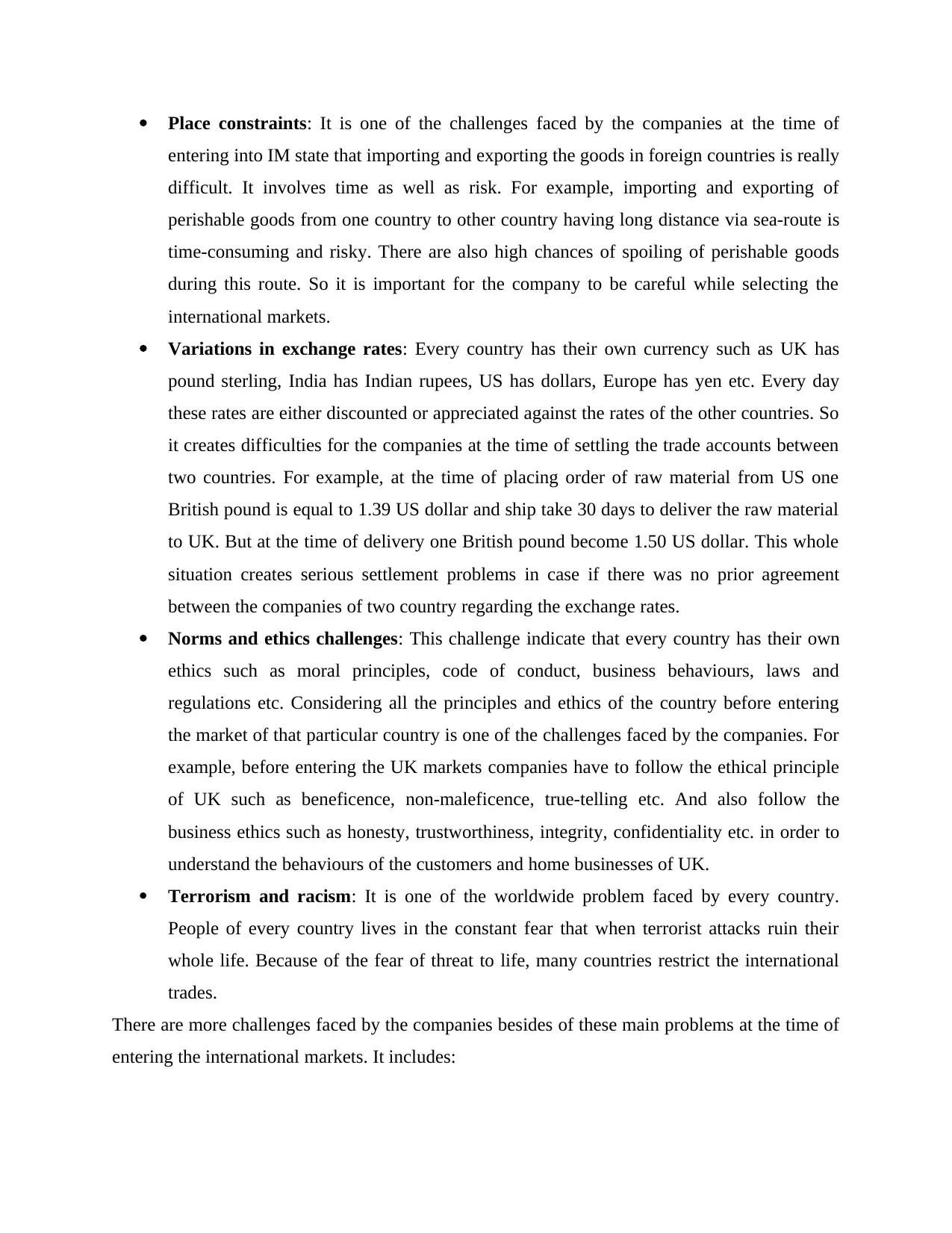
Place constraints: It is one of the challenges faced by the companies at the time of
entering into IM state that importing and exporting the goods in foreign countries is really
difficult. It involves time as well as risk. For example, importing and exporting of
perishable goods from one country to other country having long distance via sea-route is
time-consuming and risky. There are also high chances of spoiling of perishable goods
during this route. So it is important for the company to be careful while selecting the
international markets.
Variations in exchange rates: Every country has their own currency such as UK has
pound sterling, India has Indian rupees, US has dollars, Europe has yen etc. Every day
these rates are either discounted or appreciated against the rates of the other countries. So
it creates difficulties for the companies at the time of settling the trade accounts between
two countries. For example, at the time of placing order of raw material from US one
British pound is equal to 1.39 US dollar and ship take 30 days to deliver the raw material
to UK. But at the time of delivery one British pound become 1.50 US dollar. This whole
situation creates serious settlement problems in case if there was no prior agreement
between the companies of two country regarding the exchange rates.
Norms and ethics challenges: This challenge indicate that every country has their own
ethics such as moral principles, code of conduct, business behaviours, laws and
regulations etc. Considering all the principles and ethics of the country before entering
the market of that particular country is one of the challenges faced by the companies. For
example, before entering the UK markets companies have to follow the ethical principle
of UK such as beneficence, non-maleficence, true-telling etc. And also follow the
business ethics such as honesty, trustworthiness, integrity, confidentiality etc. in order to
understand the behaviours of the customers and home businesses of UK.
Terrorism and racism: It is one of the worldwide problem faced by every country.
People of every country lives in the constant fear that when terrorist attacks ruin their
whole life. Because of the fear of threat to life, many countries restrict the international
trades.
There are more challenges faced by the companies besides of these main problems at the time of
entering the international markets. It includes:
entering into IM state that importing and exporting the goods in foreign countries is really
difficult. It involves time as well as risk. For example, importing and exporting of
perishable goods from one country to other country having long distance via sea-route is
time-consuming and risky. There are also high chances of spoiling of perishable goods
during this route. So it is important for the company to be careful while selecting the
international markets.
Variations in exchange rates: Every country has their own currency such as UK has
pound sterling, India has Indian rupees, US has dollars, Europe has yen etc. Every day
these rates are either discounted or appreciated against the rates of the other countries. So
it creates difficulties for the companies at the time of settling the trade accounts between
two countries. For example, at the time of placing order of raw material from US one
British pound is equal to 1.39 US dollar and ship take 30 days to deliver the raw material
to UK. But at the time of delivery one British pound become 1.50 US dollar. This whole
situation creates serious settlement problems in case if there was no prior agreement
between the companies of two country regarding the exchange rates.
Norms and ethics challenges: This challenge indicate that every country has their own
ethics such as moral principles, code of conduct, business behaviours, laws and
regulations etc. Considering all the principles and ethics of the country before entering
the market of that particular country is one of the challenges faced by the companies. For
example, before entering the UK markets companies have to follow the ethical principle
of UK such as beneficence, non-maleficence, true-telling etc. And also follow the
business ethics such as honesty, trustworthiness, integrity, confidentiality etc. in order to
understand the behaviours of the customers and home businesses of UK.
Terrorism and racism: It is one of the worldwide problem faced by every country.
People of every country lives in the constant fear that when terrorist attacks ruin their
whole life. Because of the fear of threat to life, many countries restrict the international
trades.
There are more challenges faced by the companies besides of these main problems at the time of
entering the international markets. It includes:
Paraphrase This Document
Need a fresh take? Get an instant paraphrase of this document with our AI Paraphraser
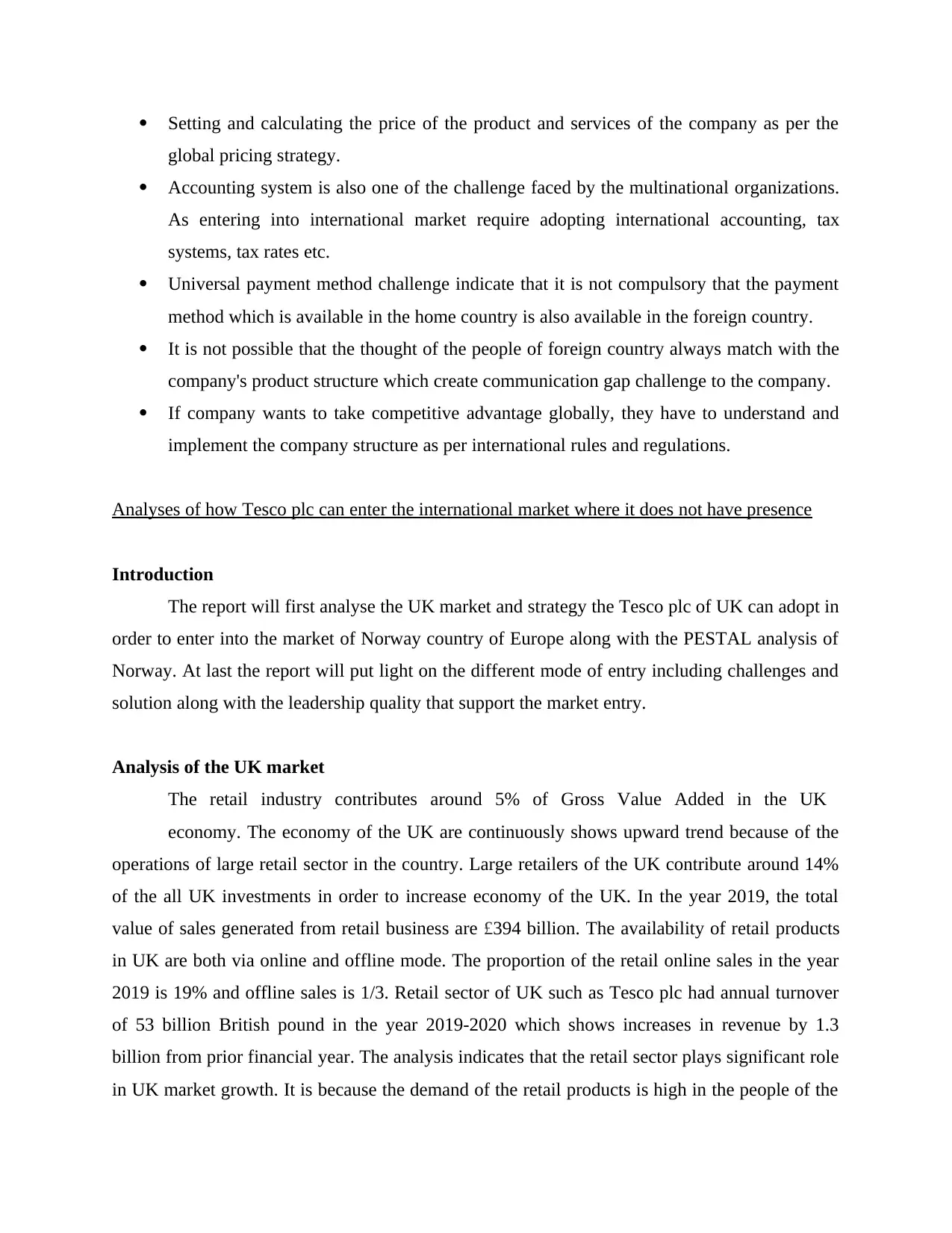
Setting and calculating the price of the product and services of the company as per the
global pricing strategy.
Accounting system is also one of the challenge faced by the multinational organizations.
As entering into international market require adopting international accounting, tax
systems, tax rates etc.
Universal payment method challenge indicate that it is not compulsory that the payment
method which is available in the home country is also available in the foreign country.
It is not possible that the thought of the people of foreign country always match with the
company's product structure which create communication gap challenge to the company.
If company wants to take competitive advantage globally, they have to understand and
implement the company structure as per international rules and regulations.
Analyses of how Tesco plc can enter the international market where it does not have presence
Introduction
The report will first analyse the UK market and strategy the Tesco plc of UK can adopt in
order to enter into the market of Norway country of Europe along with the PESTAL analysis of
Norway. At last the report will put light on the different mode of entry including challenges and
solution along with the leadership quality that support the market entry.
Analysis of the UK market
The retail industry contributes around 5% of Gross Value Added in the UK
economy. The economy of the UK are continuously shows upward trend because of the
operations of large retail sector in the country. Large retailers of the UK contribute around 14%
of the all UK investments in order to increase economy of the UK. In the year 2019, the total
value of sales generated from retail business are £394 billion. The availability of retail products
in UK are both via online and offline mode. The proportion of the retail online sales in the year
2019 is 19% and offline sales is 1/3. Retail sector of UK such as Tesco plc had annual turnover
of 53 billion British pound in the year 2019-2020 which shows increases in revenue by 1.3
billion from prior financial year. The analysis indicates that the retail sector plays significant role
in UK market growth. It is because the demand of the retail products is high in the people of the
global pricing strategy.
Accounting system is also one of the challenge faced by the multinational organizations.
As entering into international market require adopting international accounting, tax
systems, tax rates etc.
Universal payment method challenge indicate that it is not compulsory that the payment
method which is available in the home country is also available in the foreign country.
It is not possible that the thought of the people of foreign country always match with the
company's product structure which create communication gap challenge to the company.
If company wants to take competitive advantage globally, they have to understand and
implement the company structure as per international rules and regulations.
Analyses of how Tesco plc can enter the international market where it does not have presence
Introduction
The report will first analyse the UK market and strategy the Tesco plc of UK can adopt in
order to enter into the market of Norway country of Europe along with the PESTAL analysis of
Norway. At last the report will put light on the different mode of entry including challenges and
solution along with the leadership quality that support the market entry.
Analysis of the UK market
The retail industry contributes around 5% of Gross Value Added in the UK
economy. The economy of the UK are continuously shows upward trend because of the
operations of large retail sector in the country. Large retailers of the UK contribute around 14%
of the all UK investments in order to increase economy of the UK. In the year 2019, the total
value of sales generated from retail business are £394 billion. The availability of retail products
in UK are both via online and offline mode. The proportion of the retail online sales in the year
2019 is 19% and offline sales is 1/3. Retail sector of UK such as Tesco plc had annual turnover
of 53 billion British pound in the year 2019-2020 which shows increases in revenue by 1.3
billion from prior financial year. The analysis indicates that the retail sector plays significant role
in UK market growth. It is because the demand of the retail products is high in the people of the
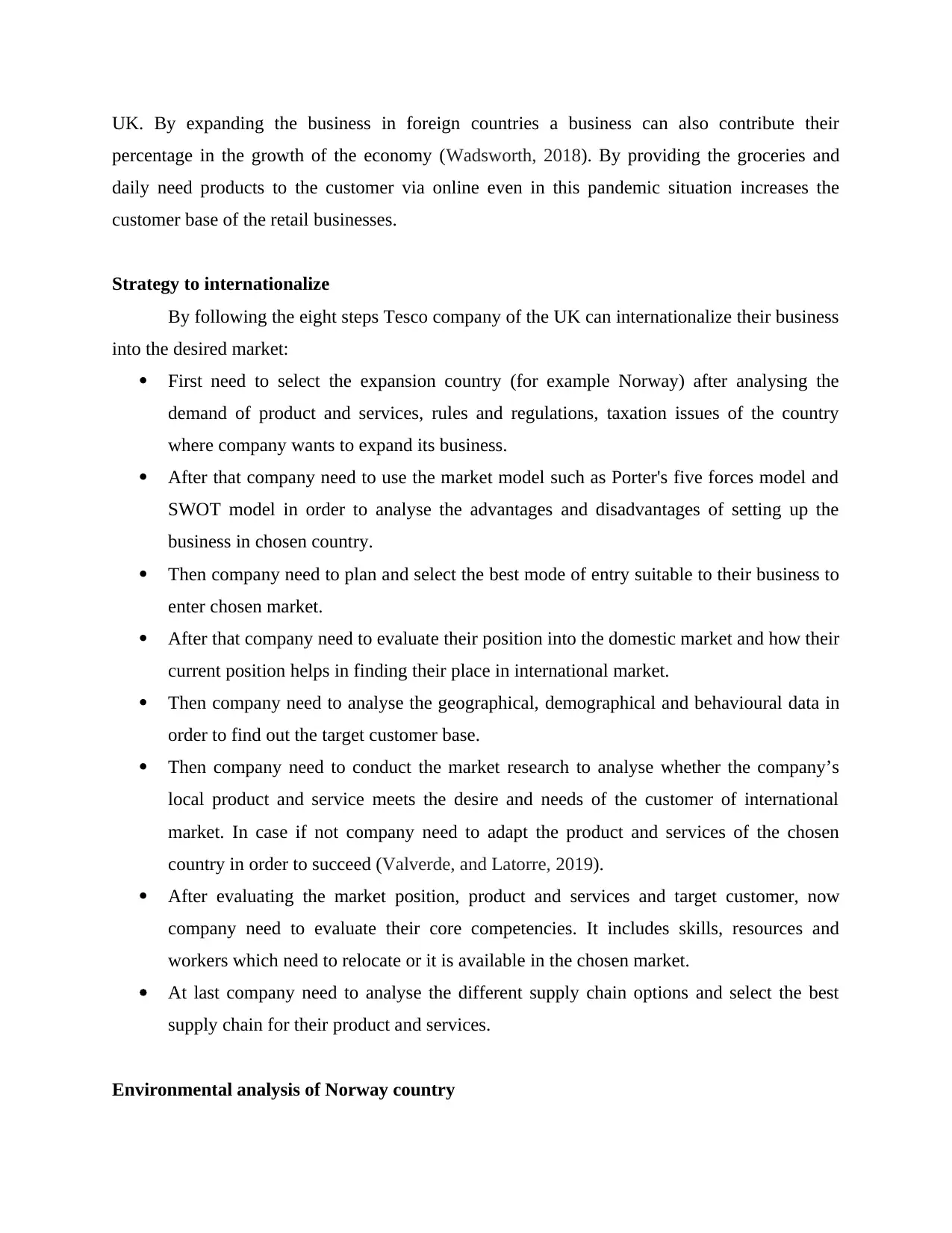
UK. By expanding the business in foreign countries a business can also contribute their
percentage in the growth of the economy (Wadsworth, 2018). By providing the groceries and
daily need products to the customer via online even in this pandemic situation increases the
customer base of the retail businesses.
Strategy to internationalize
By following the eight steps Tesco company of the UK can internationalize their business
into the desired market:
First need to select the expansion country (for example Norway) after analysing the
demand of product and services, rules and regulations, taxation issues of the country
where company wants to expand its business.
After that company need to use the market model such as Porter's five forces model and
SWOT model in order to analyse the advantages and disadvantages of setting up the
business in chosen country.
Then company need to plan and select the best mode of entry suitable to their business to
enter chosen market.
After that company need to evaluate their position into the domestic market and how their
current position helps in finding their place in international market.
Then company need to analyse the geographical, demographical and behavioural data in
order to find out the target customer base.
Then company need to conduct the market research to analyse whether the company’s
local product and service meets the desire and needs of the customer of international
market. In case if not company need to adapt the product and services of the chosen
country in order to succeed (Valverde, and Latorre, 2019).
After evaluating the market position, product and services and target customer, now
company need to evaluate their core competencies. It includes skills, resources and
workers which need to relocate or it is available in the chosen market.
At last company need to analyse the different supply chain options and select the best
supply chain for their product and services.
Environmental analysis of Norway country
percentage in the growth of the economy (Wadsworth, 2018). By providing the groceries and
daily need products to the customer via online even in this pandemic situation increases the
customer base of the retail businesses.
Strategy to internationalize
By following the eight steps Tesco company of the UK can internationalize their business
into the desired market:
First need to select the expansion country (for example Norway) after analysing the
demand of product and services, rules and regulations, taxation issues of the country
where company wants to expand its business.
After that company need to use the market model such as Porter's five forces model and
SWOT model in order to analyse the advantages and disadvantages of setting up the
business in chosen country.
Then company need to plan and select the best mode of entry suitable to their business to
enter chosen market.
After that company need to evaluate their position into the domestic market and how their
current position helps in finding their place in international market.
Then company need to analyse the geographical, demographical and behavioural data in
order to find out the target customer base.
Then company need to conduct the market research to analyse whether the company’s
local product and service meets the desire and needs of the customer of international
market. In case if not company need to adapt the product and services of the chosen
country in order to succeed (Valverde, and Latorre, 2019).
After evaluating the market position, product and services and target customer, now
company need to evaluate their core competencies. It includes skills, resources and
workers which need to relocate or it is available in the chosen market.
At last company need to analyse the different supply chain options and select the best
supply chain for their product and services.
Environmental analysis of Norway country
⊘ This is a preview!⊘
Do you want full access?
Subscribe today to unlock all pages.

Trusted by 1+ million students worldwide
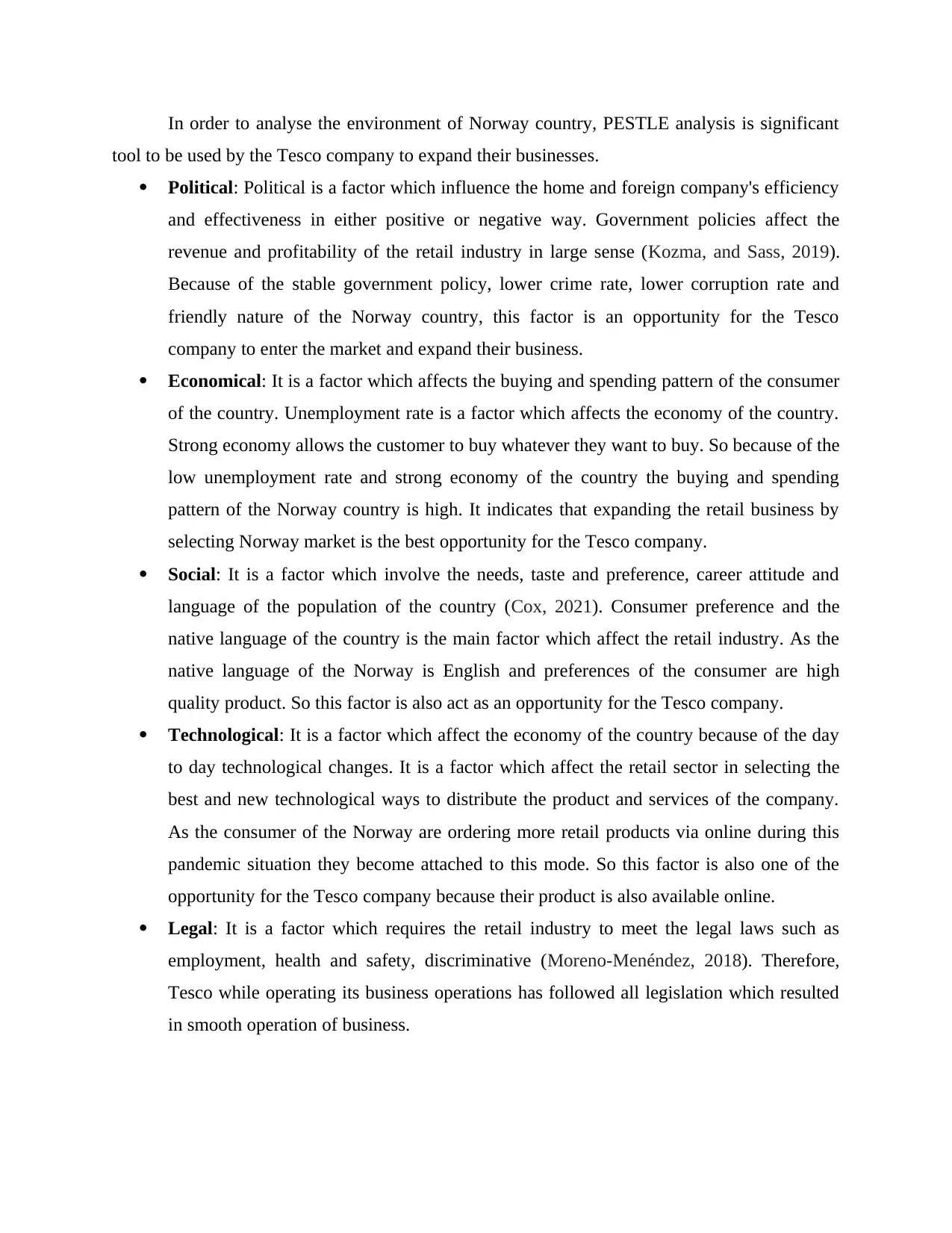
In order to analyse the environment of Norway country, PESTLE analysis is significant
tool to be used by the Tesco company to expand their businesses.
Political: Political is a factor which influence the home and foreign company's efficiency
and effectiveness in either positive or negative way. Government policies affect the
revenue and profitability of the retail industry in large sense (Kozma, and Sass, 2019).
Because of the stable government policy, lower crime rate, lower corruption rate and
friendly nature of the Norway country, this factor is an opportunity for the Tesco
company to enter the market and expand their business.
Economical: It is a factor which affects the buying and spending pattern of the consumer
of the country. Unemployment rate is a factor which affects the economy of the country.
Strong economy allows the customer to buy whatever they want to buy. So because of the
low unemployment rate and strong economy of the country the buying and spending
pattern of the Norway country is high. It indicates that expanding the retail business by
selecting Norway market is the best opportunity for the Tesco company.
Social: It is a factor which involve the needs, taste and preference, career attitude and
language of the population of the country (Cox, 2021). Consumer preference and the
native language of the country is the main factor which affect the retail industry. As the
native language of the Norway is English and preferences of the consumer are high
quality product. So this factor is also act as an opportunity for the Tesco company.
Technological: It is a factor which affect the economy of the country because of the day
to day technological changes. It is a factor which affect the retail sector in selecting the
best and new technological ways to distribute the product and services of the company.
As the consumer of the Norway are ordering more retail products via online during this
pandemic situation they become attached to this mode. So this factor is also one of the
opportunity for the Tesco company because their product is also available online.
Legal: It is a factor which requires the retail industry to meet the legal laws such as
employment, health and safety, discriminative (Moreno-Menéndez, 2018). Therefore,
Tesco while operating its business operations has followed all legislation which resulted
in smooth operation of business.
tool to be used by the Tesco company to expand their businesses.
Political: Political is a factor which influence the home and foreign company's efficiency
and effectiveness in either positive or negative way. Government policies affect the
revenue and profitability of the retail industry in large sense (Kozma, and Sass, 2019).
Because of the stable government policy, lower crime rate, lower corruption rate and
friendly nature of the Norway country, this factor is an opportunity for the Tesco
company to enter the market and expand their business.
Economical: It is a factor which affects the buying and spending pattern of the consumer
of the country. Unemployment rate is a factor which affects the economy of the country.
Strong economy allows the customer to buy whatever they want to buy. So because of the
low unemployment rate and strong economy of the country the buying and spending
pattern of the Norway country is high. It indicates that expanding the retail business by
selecting Norway market is the best opportunity for the Tesco company.
Social: It is a factor which involve the needs, taste and preference, career attitude and
language of the population of the country (Cox, 2021). Consumer preference and the
native language of the country is the main factor which affect the retail industry. As the
native language of the Norway is English and preferences of the consumer are high
quality product. So this factor is also act as an opportunity for the Tesco company.
Technological: It is a factor which affect the economy of the country because of the day
to day technological changes. It is a factor which affect the retail sector in selecting the
best and new technological ways to distribute the product and services of the company.
As the consumer of the Norway are ordering more retail products via online during this
pandemic situation they become attached to this mode. So this factor is also one of the
opportunity for the Tesco company because their product is also available online.
Legal: It is a factor which requires the retail industry to meet the legal laws such as
employment, health and safety, discriminative (Moreno-Menéndez, 2018). Therefore,
Tesco while operating its business operations has followed all legislation which resulted
in smooth operation of business.
Paraphrase This Document
Need a fresh take? Get an instant paraphrase of this document with our AI Paraphraser
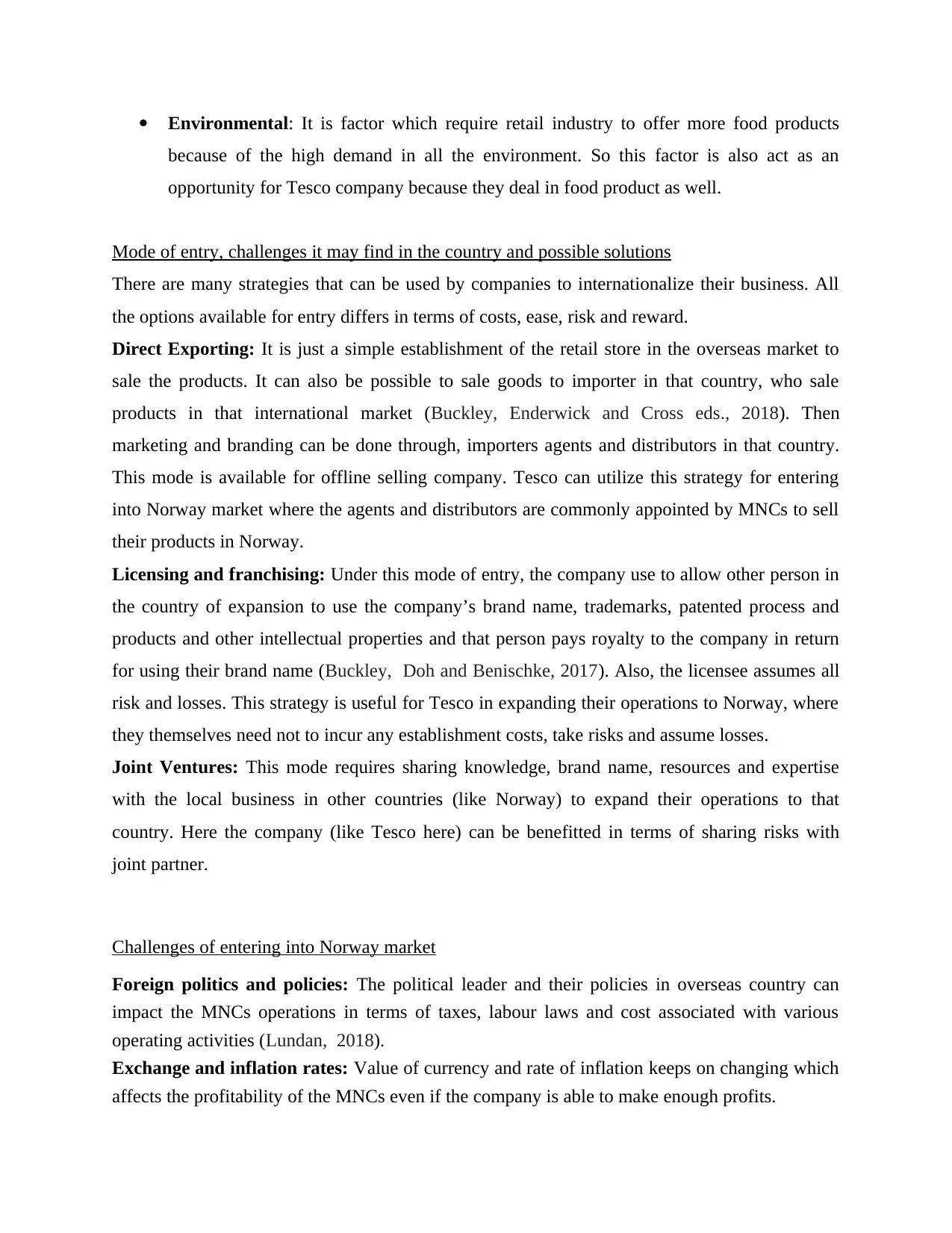
Environmental: It is factor which require retail industry to offer more food products
because of the high demand in all the environment. So this factor is also act as an
opportunity for Tesco company because they deal in food product as well.
Mode of entry, challenges it may find in the country and possible solutions
There are many strategies that can be used by companies to internationalize their business. All
the options available for entry differs in terms of costs, ease, risk and reward.
Direct Exporting: It is just a simple establishment of the retail store in the overseas market to
sale the products. It can also be possible to sale goods to importer in that country, who sale
products in that international market (Buckley, Enderwick and Cross eds., 2018). Then
marketing and branding can be done through, importers agents and distributors in that country.
This mode is available for offline selling company. Tesco can utilize this strategy for entering
into Norway market where the agents and distributors are commonly appointed by MNCs to sell
their products in Norway.
Licensing and franchising: Under this mode of entry, the company use to allow other person in
the country of expansion to use the company’s brand name, trademarks, patented process and
products and other intellectual properties and that person pays royalty to the company in return
for using their brand name (Buckley, Doh and Benischke, 2017). Also, the licensee assumes all
risk and losses. This strategy is useful for Tesco in expanding their operations to Norway, where
they themselves need not to incur any establishment costs, take risks and assume losses.
Joint Ventures: This mode requires sharing knowledge, brand name, resources and expertise
with the local business in other countries (like Norway) to expand their operations to that
country. Here the company (like Tesco here) can be benefitted in terms of sharing risks with
joint partner.
Challenges of entering into Norway market
Foreign politics and policies: The political leader and their policies in overseas country can
impact the MNCs operations in terms of taxes, labour laws and cost associated with various
operating activities (Lundan, 2018).
Exchange and inflation rates: Value of currency and rate of inflation keeps on changing which
affects the profitability of the MNCs even if the company is able to make enough profits.
because of the high demand in all the environment. So this factor is also act as an
opportunity for Tesco company because they deal in food product as well.
Mode of entry, challenges it may find in the country and possible solutions
There are many strategies that can be used by companies to internationalize their business. All
the options available for entry differs in terms of costs, ease, risk and reward.
Direct Exporting: It is just a simple establishment of the retail store in the overseas market to
sale the products. It can also be possible to sale goods to importer in that country, who sale
products in that international market (Buckley, Enderwick and Cross eds., 2018). Then
marketing and branding can be done through, importers agents and distributors in that country.
This mode is available for offline selling company. Tesco can utilize this strategy for entering
into Norway market where the agents and distributors are commonly appointed by MNCs to sell
their products in Norway.
Licensing and franchising: Under this mode of entry, the company use to allow other person in
the country of expansion to use the company’s brand name, trademarks, patented process and
products and other intellectual properties and that person pays royalty to the company in return
for using their brand name (Buckley, Doh and Benischke, 2017). Also, the licensee assumes all
risk and losses. This strategy is useful for Tesco in expanding their operations to Norway, where
they themselves need not to incur any establishment costs, take risks and assume losses.
Joint Ventures: This mode requires sharing knowledge, brand name, resources and expertise
with the local business in other countries (like Norway) to expand their operations to that
country. Here the company (like Tesco here) can be benefitted in terms of sharing risks with
joint partner.
Challenges of entering into Norway market
Foreign politics and policies: The political leader and their policies in overseas country can
impact the MNCs operations in terms of taxes, labour laws and cost associated with various
operating activities (Lundan, 2018).
Exchange and inflation rates: Value of currency and rate of inflation keeps on changing which
affects the profitability of the MNCs even if the company is able to make enough profits.
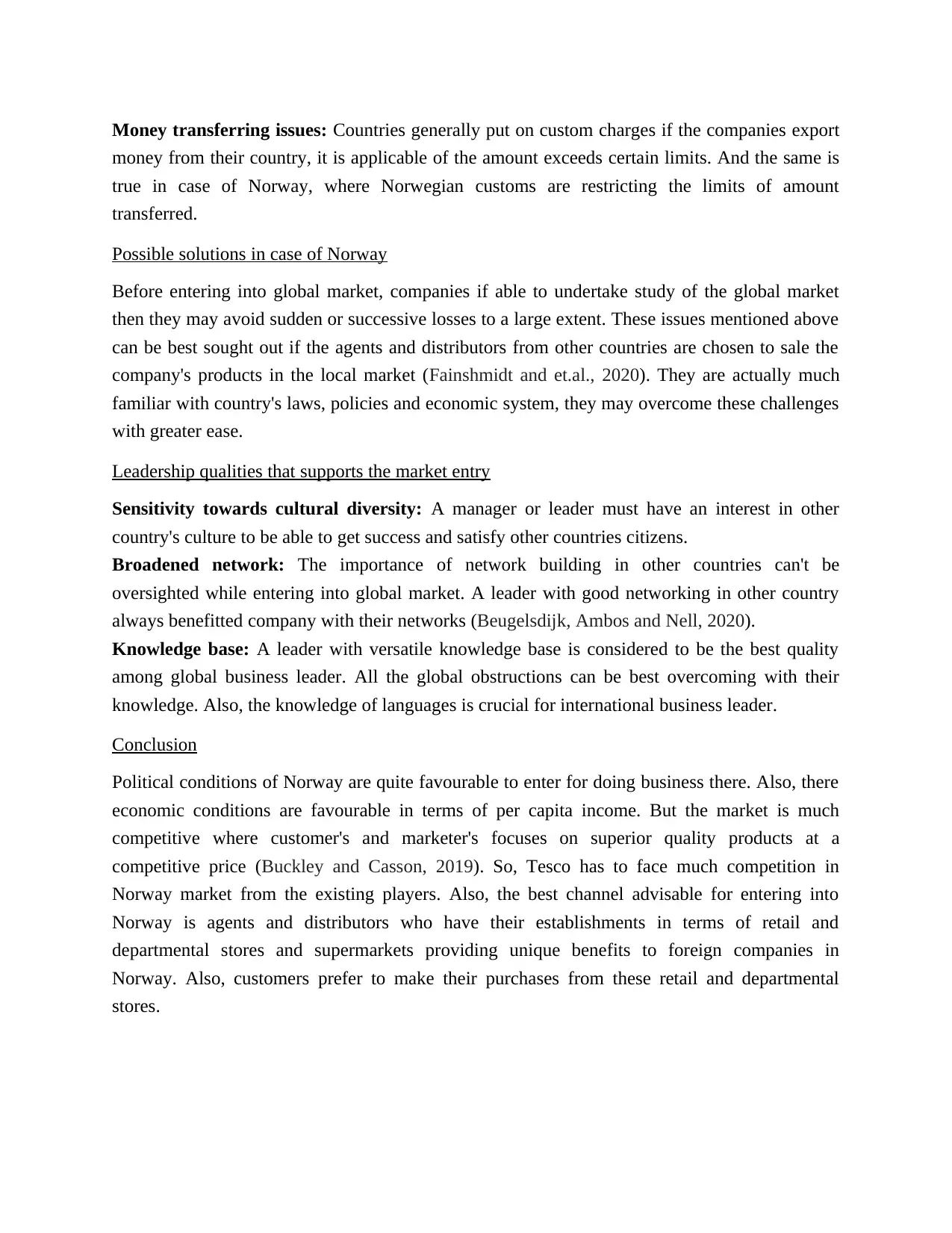
Money transferring issues: Countries generally put on custom charges if the companies export
money from their country, it is applicable of the amount exceeds certain limits. And the same is
true in case of Norway, where Norwegian customs are restricting the limits of amount
transferred.
Possible solutions in case of Norway
Before entering into global market, companies if able to undertake study of the global market
then they may avoid sudden or successive losses to a large extent. These issues mentioned above
can be best sought out if the agents and distributors from other countries are chosen to sale the
company's products in the local market (Fainshmidt and et.al., 2020). They are actually much
familiar with country's laws, policies and economic system, they may overcome these challenges
with greater ease.
Leadership qualities that supports the market entry
Sensitivity towards cultural diversity: A manager or leader must have an interest in other
country's culture to be able to get success and satisfy other countries citizens.
Broadened network: The importance of network building in other countries can't be
oversighted while entering into global market. A leader with good networking in other country
always benefitted company with their networks (Beugelsdijk, Ambos and Nell, 2020).
Knowledge base: A leader with versatile knowledge base is considered to be the best quality
among global business leader. All the global obstructions can be best overcoming with their
knowledge. Also, the knowledge of languages is crucial for international business leader.
Conclusion
Political conditions of Norway are quite favourable to enter for doing business there. Also, there
economic conditions are favourable in terms of per capita income. But the market is much
competitive where customer's and marketer's focuses on superior quality products at a
competitive price (Buckley and Casson, 2019). So, Tesco has to face much competition in
Norway market from the existing players. Also, the best channel advisable for entering into
Norway is agents and distributors who have their establishments in terms of retail and
departmental stores and supermarkets providing unique benefits to foreign companies in
Norway. Also, customers prefer to make their purchases from these retail and departmental
stores.
money from their country, it is applicable of the amount exceeds certain limits. And the same is
true in case of Norway, where Norwegian customs are restricting the limits of amount
transferred.
Possible solutions in case of Norway
Before entering into global market, companies if able to undertake study of the global market
then they may avoid sudden or successive losses to a large extent. These issues mentioned above
can be best sought out if the agents and distributors from other countries are chosen to sale the
company's products in the local market (Fainshmidt and et.al., 2020). They are actually much
familiar with country's laws, policies and economic system, they may overcome these challenges
with greater ease.
Leadership qualities that supports the market entry
Sensitivity towards cultural diversity: A manager or leader must have an interest in other
country's culture to be able to get success and satisfy other countries citizens.
Broadened network: The importance of network building in other countries can't be
oversighted while entering into global market. A leader with good networking in other country
always benefitted company with their networks (Beugelsdijk, Ambos and Nell, 2020).
Knowledge base: A leader with versatile knowledge base is considered to be the best quality
among global business leader. All the global obstructions can be best overcoming with their
knowledge. Also, the knowledge of languages is crucial for international business leader.
Conclusion
Political conditions of Norway are quite favourable to enter for doing business there. Also, there
economic conditions are favourable in terms of per capita income. But the market is much
competitive where customer's and marketer's focuses on superior quality products at a
competitive price (Buckley and Casson, 2019). So, Tesco has to face much competition in
Norway market from the existing players. Also, the best channel advisable for entering into
Norway is agents and distributors who have their establishments in terms of retail and
departmental stores and supermarkets providing unique benefits to foreign companies in
Norway. Also, customers prefer to make their purchases from these retail and departmental
stores.
⊘ This is a preview!⊘
Do you want full access?
Subscribe today to unlock all pages.

Trusted by 1+ million students worldwide
1 out of 19
Related Documents
Your All-in-One AI-Powered Toolkit for Academic Success.
+13062052269
info@desklib.com
Available 24*7 on WhatsApp / Email
![[object Object]](/_next/static/media/star-bottom.7253800d.svg)
Unlock your academic potential
Copyright © 2020–2026 A2Z Services. All Rights Reserved. Developed and managed by ZUCOL.





